Economy
Erdoğan urges greater intra-Islamic trade, finance cooperation
President Recep Tayyip Erdoğan on Friday highlighted the Muslim world’s underperformance and untapped economic potential, urging for greater intra-Islamic cooperation in trade, finance and investment.
Addressing delegates at the 2nd Global Islamic Economy Summit in Istanbul, Erdoğan emphasized the disparity between the Muslim world’s demographic weight and its economic clout.
“Muslims account for 25% of the world’s population, yet Islamic finance assets total only about $2.5 trillion,” he told the event organized by the AlBaraka Forum for Islamic Economy at the Istanbul Financial Center (IFC).
“The Organisation of Islamic Cooperation (OIC), which is the largest international organization after the United Nations, consists of 57 member countries. However, their share in global trade is only around 11%,” Erdoğan said.
“In terms of population, we represent 25% of the world, yet our contribution to the global economy is approximately 9%.”
These figures, according to Erdoğan, reflect underperformance compared to the potential of the Islamic world. “As the Islamic world, we must maximize our trade, investment, financial cooperation and collaboration opportunities,” he added.
Erdoğan went on to reiterate his opposition to interest-based systems, while saying Ankara was determined to press on with its current economic program until all of its goals are achieved.
Under the program, launched in mid-2023, the Central Bank of the Republic of Türkiye (CBRT) had tightened its benchmark policy to contain inflation, which dipped to below 38% in April, from as high as 75% last May.
‘Longing ‘ for interest-free economy
Erdoğan said work must be done to change and find alternatives to what he called an interest rates-based economic system, and added such a system cannot be viewed as legitimate.
“I have always opposed the distorted system that deepens inequalities, disrupts income justice, and turns billions of people into the slaves of a handful of capitalists. I oppose it again. I have often said that, no matter what, we cannot view as legitimate interest rates and an economic system based on interest rates,” Erdoğan said.
“I will continue to voice my longing for an interest rate-free economy from now on too. We will not turn back from our battle for the economic order based on interest rates to change,” he added.
The president also vowed to continue implementing the economic agenda drafted by his treasury and finance minister, Mehmet Şimşek, in order to chart a path of disinflation.
“We are determined to implement our economic program, with which we have made noteworthy progress over the past two years, until it reaches its goals,” Erdoğan said, and added that the end goal was to achieve single-digit inflation.
Current system ‘cannot be sustained’
The president went on to say it is increasingly evident that there is a growing need for alternative paradigms across all sectors. In economics, particularly in finance, there is a rising demand for a human-centered, fair, compassionate and responsible approach, he noted.
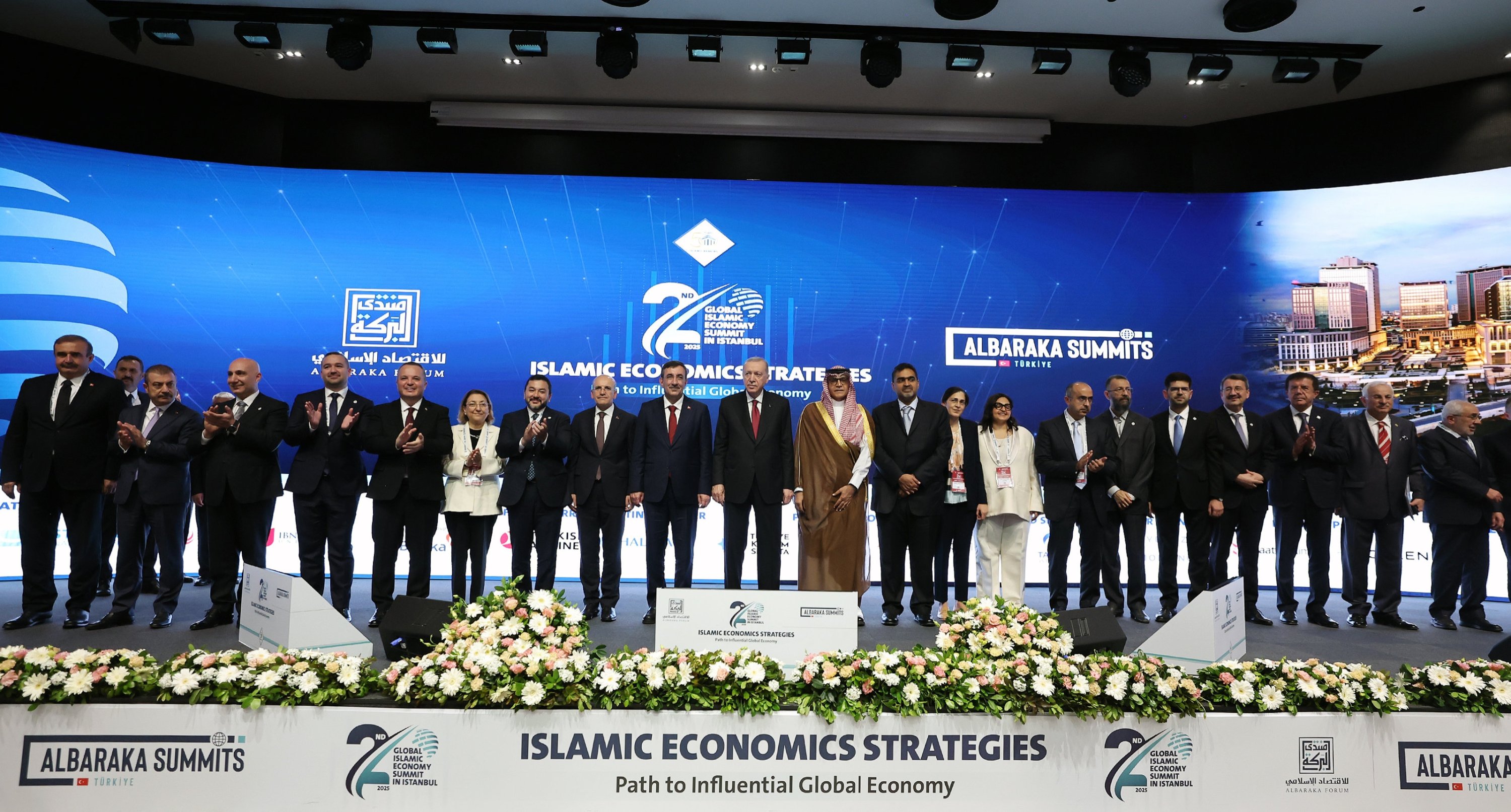
“One undeniable truth has become clear to everyone: the current global economic system, with its flawed structure that prioritizes consumption and profit maximization, continues to sideline human values, exacerbate inequalities and promote growth without productivity,” said Erdoğan.
Instead of developing effective solutions to support economic development, he argued that the existing system conceals fundamental issues with superficial measures.
“Many experts and thinkers who have correctly analyzed the current situation assert that the system, in its current form, cannot be sustained any longer.”
Erdoğan underscored Türkiye’s ambitions to position Istanbul as a global Islamic finance hub, pointing to initiatives under the Istanbul Financial Center framework as evidence of the country’s commitment.
“The collaborations we have initiated under the Istanbul Financial Center serve as a concrete testament to our efforts to integrate into the global economy while preserving our Islamic values,” he said.
The president stressed that Türkiye attaches great importance to the development of participation finance centered in Istanbul.
“Its unique location, accumulated expertise and potential provide substantial advantages to both Istanbul and the Istanbul Financial Center. With the dedicated efforts of our institutions and authorities, I hope we can transform these advantages into lasting achievements,” he added.
Islamic finance law
Also addressing the summit, Şimşek said Türkiye is actively working on a new Islamic finance law, aiming to pass it through Parliament as part of broader efforts to strengthen the country’s participation-based financial system.
Şimşek underlined the increasing importance of Islamic finance in tackling global economic challenges. He noted the sector’s potential to offer a fairer, risk-sharing and asset-backed financial model, especially in today’s uncertain global landscape.
“We are currently finalizing the Islamic finance law and preparing to introduce it to Parliament,” he said. “We are carefully reviewing the draft to avoid including provisions that may cause implementation issues or hinder sectoral acceptance.”
Şimşek emphasized that Islamic finance, with its focus on sustainability, real-economy backing and inclusive access, presents a credible alternative for promoting shared prosperity.
“The Islamic finance model stands out today because it emphasizes equitable participation, financial inclusion and sustainable growth,” he said.
Şimşek pointed out that Islamic finance currently represents just over 1% of global financial assets but has witnessed rapid growth in both market value and presence.
However, he noted that much of this growth remains geographically concentrated, and that challenges such as regulatory gaps, talent shortages and a lack of global innovation investment persist.
“The key players in this field are not investing in this innovation on a global scale. At the same time, there is a lack of talent and significant gaps in the regulatory framework,” said the minister.
“Important progress has been made in recent years, but we are still facing major structural challenges that need to be overcome. Only if we can clearly identify the factors causing us to lag behind will we be able to develop effective solutions,” he added.
Islamic finance in Türkiye
Türkiye currently has nine participation banks, with Islamic finance holding an 8.3% share of the national banking system.
Şimşek said this figure remains far below its true potential.
“Participation finance in Türkiye has reached a significant share within the banking sector. The markets, particularly in terms of participation-based financing instruments, are showing development,” he said.
“However, currently, participation banks account for only 8.3% of the Turkish banking system, which is far below its potential and clearly indicates the need for broader-scale growth.”
He stressed the government is mobilizing all its resources to ensure the healthy growth of the sector, citing Türkiye’s recent ranking in the top 10 of the Global Islamic Finance Development Index among 136 countries.
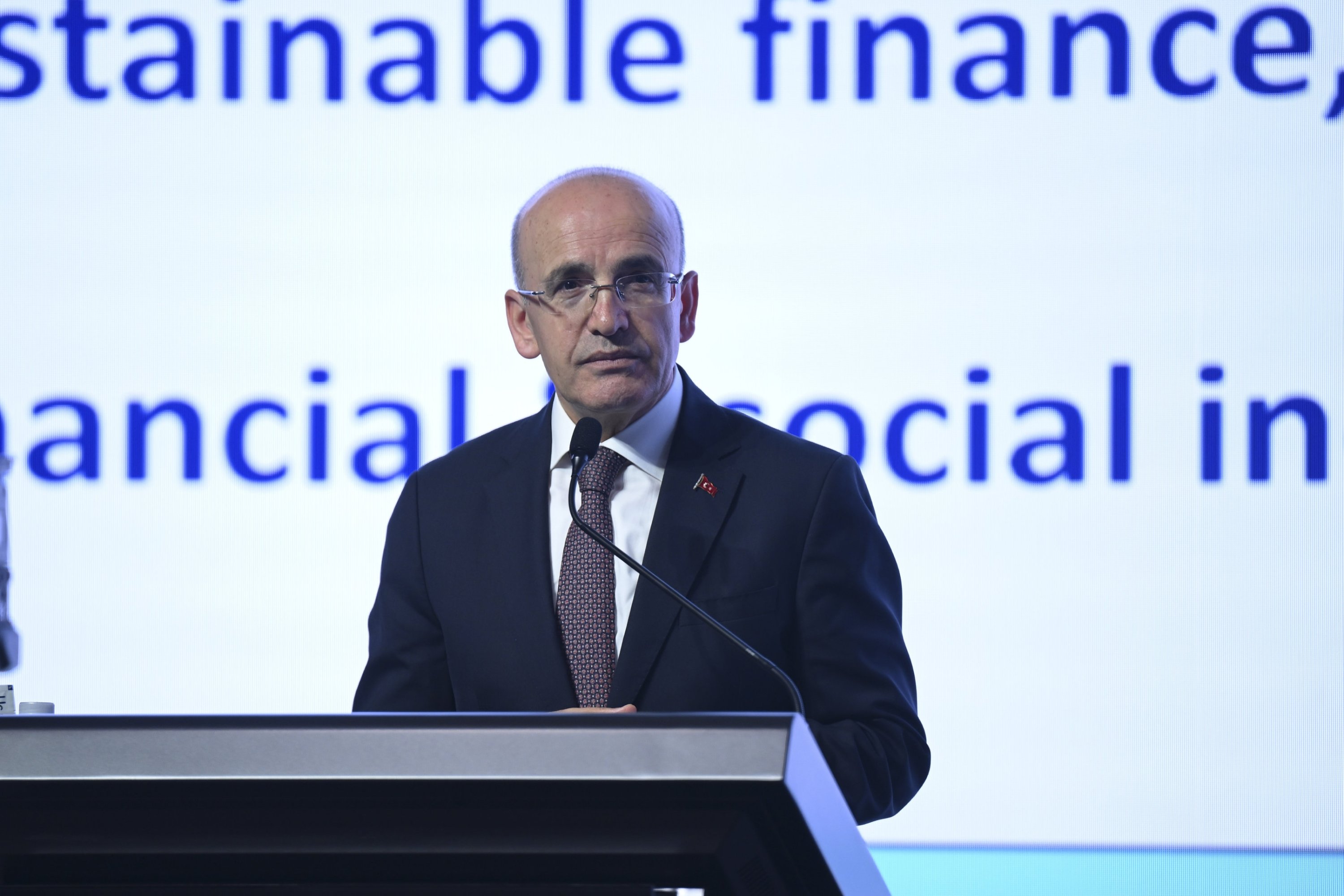
He also emphasized that the Treasury continues to emphasize sukuk issuances both locally and internationally.
Şimşek went on to emphasize that prosperity should be shared fairly, and said they see Islamic finance as playing a crucial role in this process.
“Although it currently holds a relatively small share in the global financial system, summits and international conferences in this field significantly accelerate its development,” he said.
“The rapid growth of Islamic finance in recent years is remarkable. Previously almost invisible, it now represents approximately 1% of global financial assets. We should see this as a springboard,” he added.
“By recognizing existing issues at both local and global levels, taking the right steps, improving efficiency and fostering strong collaborations, we can increase this share to 2% or even 5% in a much shorter time frame.”
The Global Islamic Economy Summit focuses on empowering Islamic financial and non-financial institutions to help achieve their goals of sustainable growth and leave an impact on the global economy via new strategies.
The two-day event has been organized in collaboration with Türkiye’s Investment and Finance Office, the Istanbul Financial Center (IFC), Albaraka Türk, Ibn Haldun University and the Islamic Cooperation Youth Forum (ICYF).
The summit is focused on increasing operational efficiency, encouraging innovation, strengthening risk management, promoting financial participation and supporting cooperation among industry stakeholders by developing a deeper understanding of Islamic principles.
High-level discussions on the integration of Islamic economic principles are expected at the summit.
“We look to create new roads, not just to walk on new roads. We are creating in Istanbul, Medina, London, Kuala Lumpur, Karachi, Cairo and many others,” Yousef Hassan Khalawi, the secretary-general of the AlBaraka Forum for Islamic Economy, said at the opening ceremony.
As part of the Islamic ecosystem, more and more initiatives should be created, he added.
Human-centered alternative
Addressing the event, Bilal Erdoğan, chair of the board of trustees of Türkiye’s Ilim Yayma Foundation, said Islamic economics is not just an interest-free financial model but a moral, justice-based and human-centered way of life that offers an alternative paradigm for the world.
The widespread information gap surrounding Islamic finance remains a key concern remains, even in Türkiye, where it accounts for around 8% of the financial sector, said Erdoğan.
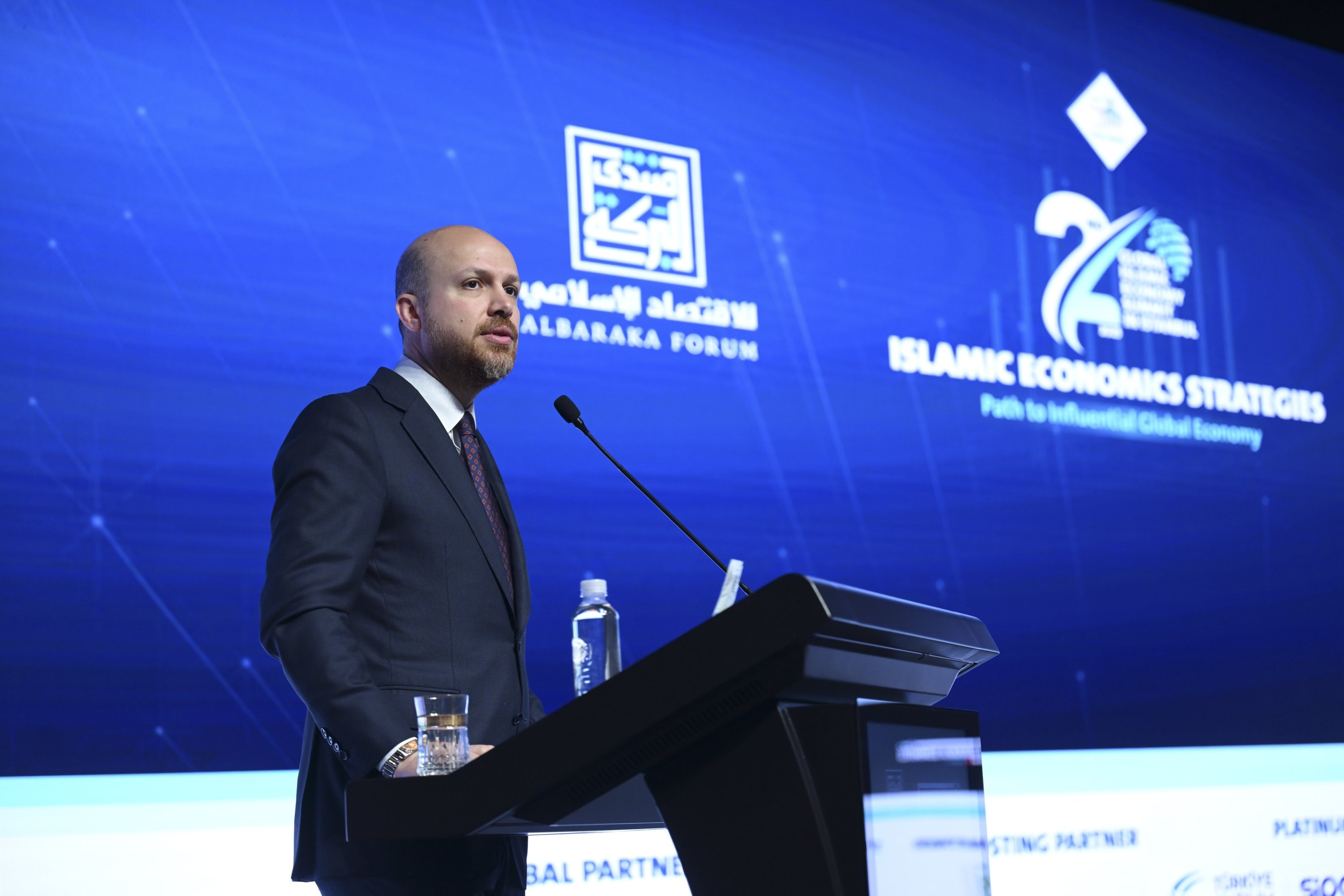
Many people, he noted, reduce Islamic finance to an interest-free tool, failing to understand its foundational values.
“It is not really only about an interest-free way of reaching finance. It is actually a potential alternative paradigm for humanity,” he said. “It is actually a potential alternative paradigm for humanity.”
He also criticized Islamic financial institutions in Türkiye for being overly cautious in their approach and lacking effective communication strategies.
“How do we frame our products? How do we try to make sure that people realize that there are these ways of doing similar things as well?” Erdoğan said, urging a stronger focus on Islamic finance’s unique features, particularly its principles of partnership and participation.
He added that millions of people around the world remain outside the banking system not due to exclusion, but because the system itself has “lost its humanity.” Islamic finance, he said, should aim to integrate these individuals by “uplifting them with the dignity that it offers.”
Addressing the humanitarian crisis in Palestine, he added: “I am hoping for once this genocide will come to an end.”
Economy
Ex-Prince Andrew appears to have shared UK trade files with Epstein
Andrew Mountbatten-Windsor, the younger brother of King Charles, shared confidential British trade documents with Jeffrey Epstein in 2010, leaking information to the late sex offender during his tenure as a government envoy, emails appear to show.
The former prince, 65, has faced years of scrutiny over his friendship with Epstein, a relationship that has cost him his role in the royal family, titles and home. Andrew has always denied any wrongdoing and not responded to requests for comment since the latest release of Epstein files.
In the latest batch of files released in the U.S., emails appear to show that Andrew forwarded to Epstein reports about Vietnam, Singapore and other places, which he had been sent in relation to a trip he made in an official capacity.
It was not immediately clear whether authorities were planning to open an investigation into Andrew’s sharing of information.
Trade envoys are usually barred from sharing sensitive or commercial documents under confidentiality rules.
Over the last 10 days, revelations from the Epstein files have engulfed British Prime Minister Keir Starmer in the biggest crisis of his premiership, after he appointed an acquaintance of Epstein, Peter Mandelson, as ambassador to the United States.
Like Andrew, it appears that Mandelson also shared sensitive government files from 2009 and 2010 with Epstein, and police are investigating claims of misconduct in public office.
Thames Valley Police said last week they were reviewing a new allegation against Andrew involving a woman being taken to an address in Windsor in light of the latest Epstein files.
Mountbatten-Windsor, the second son of the late Queen Elizabeth, was forced to quit all official royal duties in 2019 and, last October, Charles removed his title of prince. Andrew was moved out of his royal mansion last week.
Economy
UK borrowing costs up as investors question Starmer’s future
British government bond yields surged early on Monday as investors continued to weigh the political future of Prime Minister Keir Starmer amid the fallout from the Epstein crisis, although they later eased to move more in line with U.S. Treasuries.
Starmer’s chief of staff, Morgan McSweeney, quit on Sunday, saying he took responsibility for advising Starmer to appoint Peter Mandelson as ambassador to the U.S. despite his known links to Jeffrey Epstein.
Some in Starmer’s Labor Party are openly questioning his judgment and his future, and investors are increasingly bracing for a challenge to his leadership, raising uncertainty over the path of British fiscal policy.
On Monday, Starmer’s director of communications, Tim Allan, also resigned.
The 10-year gilt yield rose to a high of 4.554% at 08:21 a.m. GMT, up 4 basis points on the day, before easing to 4.533%, in line with a rise in 10-year U.S. Treasuries. Long-dated gilt yields, most sensitive to worries over the budget outlook, rose by similar amounts.
“The decision by his most senior adviser to fall on his sword may buy Starmer some time, but signs of widespread discontent on the backbench, compounded by diabolically bad poll results, are creating the impression that his days are numbered,” said Benjamin Picton, senior market strategist at Rabobank.
On Feb. 5, when there was a previous bout of concerns about Starmer’s future, 10-year gilt yields rose to their highest since Nov. 20 at 4.605% before retreating sharply after the Bank of England (BoE) came closer than expected to cutting interest rates in that day’s decision.
However, gilt auctions in recent weeks have shown exceptionally strong levels of demand. The sale of a five-year gilt due on Tuesday will provide the next test of investor appetite. Economic growth data on Thursday could also move the market.
Economy
Türkiye stops chicken exports after pre-Ramadan price hikes
Türkiye has decided to suspend chicken meat exports ahead of the Muslim holy month of Ramadan in a bid to stabilize domestic prices and prevent what authorities described as unjustified increases that could strain consumers.
The decision came after domestic poultry producers and sellers raised prices by as much as 15% before Ramadan, prompting the government to intervene to protect the domestic market.
The Trade Ministry said the decision aimed to support the supply-demand balance and curb volatility in food prices.
Ramadan is a month when Muslims are united in a ritual of daily fasting from dawn to sunset. This year’s Ramadan is due to start next week.
For Muslims, it’s a time of increased worship, religious reflection, charity and good deeds. Socially, it often brings families and friends together in festive gatherings around meals to break their fast.
Türkiye frequently takes temporary trade measures ahead of Ramadan, when food demand typically rises, to contain inflation and ensure a stable supply of essential goods.
Annual inflation in Türkiye has been gradually easing and lastly dipped to 30.65% in January. Still, food has been one of the main contributors to rising prices.
In a statement, the Trade Ministry said recent regional developments affecting food markets, combined with rising domestic demand and seasonal shifts in consumption patterns, have accelerated price movements in certain product groups, including poultry.
“Price developments in the poultry meat market have been closely monitored, and it has been carefully assessed whether price formation has remained within the framework of normal market conditions,” the ministry said.
“Within this framework, as a step to support the supply-demand balance in the market, measures to suspend poultry meat exports have been implemented as of today.”
The ministry added that “any practice or speculative pricing behavior that could victimize our consumers or disrupt market mechanisms through exorbitant price exploitation is being closely monitored,” noting that the necessary inspection and sanction processes were being carried out with “determination.”
Ramadan is the ninth month of the Islamic lunar calendar; the month cycles through the seasons.
The start of the month traditionally depends on the sighting of the crescent moon. This year, the first day is expected to be on Feb. 19.
Fasting is one of the Five Pillars of Islam, along with the profession of faith, prayer, almsgiving and pilgrimage.
Muslims see various meanings and lessons in observing the fast.
It’s regarded as an act of worship to attain God-conscious piety and one of submission to God. The devout see benefits, including practicing self-restraint, growing closer to God, cultivating gratitude and empathizing with people who are poor and hungry.
The daily fast in Ramadan includes abstaining from all food and drink – not even a sip of water is allowed – from dawn to sunset before breaking the fast in a meal known as “iftar” in Arabic.
Economy
After landslide win, Japan’s Takaichi may struggle to soothe markets
Japanese stocks rose to hit record highs on Monday after Prime Minister Sanae Takaichi’s landslide election win; however, experts warn that the country’s first woman leader could struggle to keep both voters and markets happy.
In its best result since its founding in 1955, Takaichi’s conservative Liberal Democratic Party (LDP) won a two-thirds majority in Sunday’s snap lower house election, according to Japanese media.
With the result, Takaichi, 64, managed to capitalize on her strong popularity since taking the helm of a moribund LDP in October and becoming Japan’s fifth premier in five years.
On Monday, the Nikkei 225 briefly jumped more than 5% to pass 57,000 points for the first time, while the yen strengthened against the dollar.
Analyst Kyle Rodda of Capital.com said the victory handed Takaichi “the mandate she was looking for for her big-spending agenda.”
Equities are “poised to benefit from higher fiscal spending but interest rates that remain accommodative and negative in real terms,” he said.
And SPI Asset Management’s Stephen Innes said: “Politically, the win hands… Takaichi’s freedom of movement and removes the need to bargain every decision down to the lowest common denominator.”
But a major reason for voters deserting the party in past elections was inflation, an unwelcome phenomenon for households after several decades of stable or falling prices.
The cost of rice, for example, doubled in 2025.
Food tax
After a $135-billion stimulus last year, economists said Takaichi’s room for manoeuvre was limited because of market concerns about Japan’s debt, which at more than twice the size of gross domestic product (GDP) is at a higher ratio than any other major economy.
The yen has also weakened, prompting speculation that Japanese authorities – potentially in partnership with U.S. officials – might intervene to provide support.
Off-the-cuff remarks by Takaichi earlier this month talking up the benefits for Japanese exporters of a weaker yen added to pressure on the currency.
In the election campaign, Takaichi floated the idea of suspending a consumption tax on food items, but this sent yields on long-term Japanese bonds to record levels.
On Sunday, she told local media further discussions were needed on such a move, which Bloomberg News reported would cost 5 trillion yen ($32 billion) in lost annual revenue.
“Most parties are in favor of reducing the consumption tax… I strongly want to call for the establishment of a supra-party forum to speed up discussion on this, as it is a big issue,” Takaichi said.
She also reiterated her mantra of having a “responsible and proactive” fiscal policy.
But she added: “We will ensure necessary investments. Public and private sectors must invest. We will build a strong and resilient economy.”
‘Betrayed’
Tetsuo Kotani at the Japan Institute of International Affairs said Takaichi could struggle to keep voters happy and that they could end up feeling “betrayed.”
“In reality, the policies of a Takaichi administration are unlikely to curb the inflation that voters expect her to address,” he warned.
“An income tax hike linked to increased defense spending will also be unavoidable. If these policies lead to a triple decline in stocks, the yen, and government bonds, people’s lives will become even more difficult.”
Takaichi has also pledged to increase defense spending as part of commitments to U.S. President Donald Trump that Japan will be less reliant on Washington.
Kotani said that because of a personnel shortage, linked to Japan’s low birth rate, this will “not amount to a fundamental strengthening of Japan’s defense capabilities.”
Marcel Thieliant at Capital Economics added that he did not expect Takaichi to embark on any new major spending splurges or tax cuts.
“(We) view the recent fiscal expansion as an attempt to bolster public support ahead of the election rather than as a sign of things to come,” he said in a note.
“With Upper House elections not due until 2028, we don’t expect any further major fiscal loosening.”
Hiroshi Shiratori, a politics professor of Hosei University, said Takaichi wanted to emulate the “Abenomics” of former premier Shinzo Abe – her mentor – of big spending and lower interest rates.
“But Abemonics was done at the time of deflation in Japan and a higher yen,” Shiratori said.
“Now is the time of inflation, and the cheaper yen exacerbating inflation, with the market reacting to worries over potential worsening of fiscal conditions,” he said.
“But not all voters understand this logic.”
Economy
Facing US tariffs, South Africa steps toward trade deal with China
China and South Africa inked a framework agreement for a new trade deal on Friday as Africa’s leading economy increasingly weighs other options following the steep import tariffs imposed on it by the U.S. and its diplomatic fallout with the Trump administration.
South Africa’s Ministry of Trade and Industry said the agreement would start negotiations over a deal that would give some South African goods, such as fruit, duty-free access to the Chinese market. The ministry said it expected the trade deal to be finalized by the end of March.
In return, the trade ministry said China will get enhanced investment opportunities in South Africa, where its car sales have seen rapid growth.
The U.S. slapped 30% duties on some South African goods under U.S. President Donald Trump’s reciprocal tariffs policy, one of the higher rates applied across the world. South Africa has said it is still negotiating with the U.S. for a better deal.
The China-South Africa deal follows others looking for alternatives to U.S. partnership in the face of Trump’s aggressive trade policies.
The announcement on the negotiations between China and South Africa came days after Trump issued a short-term renewal of a longstanding free-trade agreement between the U.S. and African nations. The U.S. extended the African Growth and Opportunity Act, which South Africa is a major beneficiary of, just until the end of the year and indicated it would be modified to fit the administration’s America First policy.
China is already South Africa’s largest trade partner for both imports and exports, while Chinese economic influence across the African continent continues to grow and it dominates in the extraction of Africa’s critical minerals that are key components for new high-tech products.
“South Africa looks forward to working with China in a friendly, pragmatic and flexible manner,” the trade ministry said.
Trade and Industry Minister Parks Tau, who traveled to China to sign the agreement, said the deal would benefit South Africa’s mining, agriculture, renewable energy and technology sectors.
U.S.-South Africa diplomatic ties have plunged to their worst point in decades after the Trump administration accused South Africa of pursuing an anti-American foreign policy and allowing the violent persecution of a white minority group at home. South Africa’s government has denied allegations that white Afrikaner farmers are being killed in a widespread effort to seize their land as baseless.
Trump has also barred South Africa from taking part in meetings of the Group of 20 rich and developing nations this year in the U.S.
South Africa’s biggest exports to China are gold, iron ore and platinum-group metals, while Chinese cars have quickly grown their market share in South Africa. Industry groups estimate Chinese brands have grown from around 2.8% of the South African market in 2020 to between 11% and 15% last year.
China’s BYD overtook Elon Musk’s Tesla in 2025 as the world’s biggest electric vehicle maker.
Economy
Ukrainian businesses struggle to stay afloat amid ongoing power cuts
It is early in the morning in the historic Podil district of Ukraine’s capital, Kyiv, and warm light from the Spelta bakery-bistro’s window pierces the darkness outside. On a wooden surface dusted with flour, the baker Oleksandr Kutsenko carefully divides and shapes soft, damp pieces of dough. As he places the first loaves into the oven, a sweet, delicate aroma of fresh bread fills the space.
Seconds later, the lights go out, the ovens switch off, and darkness envelops the room.
Kutsenko, 31, steps outside into the freezing night, switches on a large rectangular generator and the power kicks back in. It’s a pattern that will be repeated many times as the business struggles to keep working through the power outages caused by Russia’s bombing campaign on Ukraine’s energy grid.
“It’s now more than impossible to imagine a Ukrainian business operating without a generator,” said Olha Hrynchuk, the co-founder and head baker of Spelta.
The cost of purchasing and operating generators to overcome power outages is just one of many challenges facing Ukrainian businesses after nearly four years of war. Acute labor shortages due to mobilization and war-related migration, security risks, declining purchasing power and complicated logistics add to the pressure, officials say.
Hrynchuk, 28, opened the bakery 10 months after Russia launched its full-scale invasion in 2022. That winter was the first year Russia targeted Ukraine’s energy system. Hrynchuk says they barely know what it is to work under “normal” conditions, but have never faced the challenges they do now.
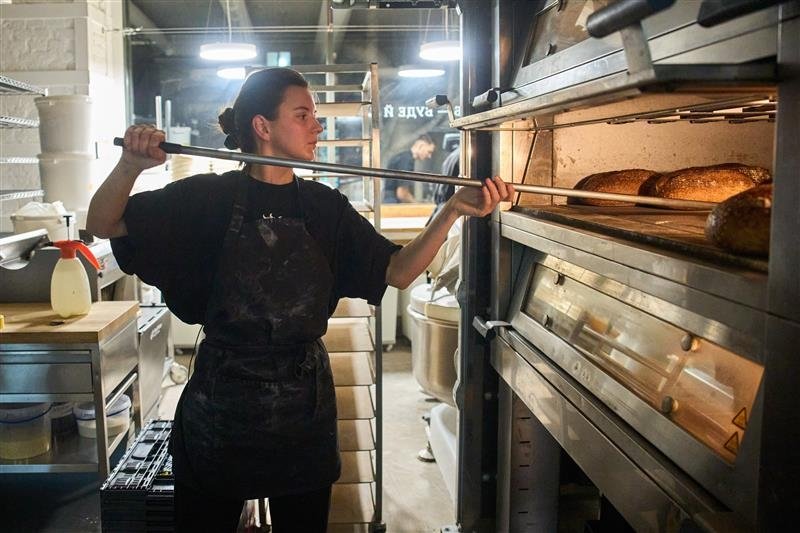
on a generator during a blackout caused by Russia’s regular air attacks
on the country’s energy system, Kyiv, Ukraine, Jan. 30, 2026. (AP Photo)
Production is entirely dependent on electricity and the generator burns about 700 hryvnias ($16) worth of fuel per hour.
Hard times
“We run on a generator for 10 to 12 hours a day. You have no fixed schedule, you have to adapt and refuel it at the same time,” Hrynchuk said.
Olha Nasonova, 52, who is head of the Restaurants of Ukraine analytical center, says the industry is experiencing its most difficult period of the past 20 years.
While businesses were prepared for electricity cuts, no one expected such a cold winter and it’s been especially tough for small cafes and family-run establishments, because they have the least financial resources.
The “Best Way to Cup” project, which has two venues and roasts and grinds its own coffee, is on the brink of permanent closure. Co-founder Yana Bilym, 33, who opened the cafe in May, said a Russian attack shattered all its windows and glass doors in August. Bilym said the cost of renovation was 150,000 hryvnias (about $3,400), half of which she financed with a bank loan that she only recently finished repaying.
Last month, after several consecutive large-scale Russian attacks on the energy sector, her entire building lost its water supply, and soon after, the sewer system stopped working.
“We were forced to close. We believe it’s temporary. Businesses in December and January, unfortunately, operate at a loss,” Bilym said.
Now she has to regularly check the coffee machine and the specialty refrigerators, which she fears may not withstand the cold. Bilym hopes the closure is short-term. Her husband volunteered to serve in the military on the front line and she wants him to have somewhere to come back to when he returns to civilian life.
Many businesses have become a lifeline for communities struggling with plunging temperatures. Ukraine’s government has allowed some firms to operate during curfew hours in the energy emergency as “Points of Invincibility,” allowing access to free electricity to charge phones and power banks, drink tea and have some respite from the cold.
Tetiana Abramova, 61, is a founder of the Rito Group, a clothing company that has been producing designer knitwear for men and women since 1991, the year Ukraine became independent.
It participates in Ukraine Fashion Week, the country’s biggest fashion show, and exports garments to the United States. Abramova took out a loan in 2022 to purchase a powerful 35-kilowatt generator costing 500,000 hryvnias ($11,500) to keep the business running during blackouts and a wood-fired boiler for heating.
“At work we have heat, we have water, we have light, and we have each other,” she said.
But it’s not easy. Operating on generators is 15%-20% more expensive than using regular electricity. As a result, production costs are currently about 15% higher than normal. Added to that, customer numbers have dropped by about 40% as many people have left the country, so the focus is now on attracting new clients through online sales.
“Profitability has fallen by around 50%, partly due to power outages,” she said. “This affects both the volume and efficiency of our work. We simply cannot operate as much as we used to.”
A macroeconomic forecast by the Kyiv School of Economics for the first quarter of 2026 says strikes on the energy system are currently the most acute short-term risk to the country’s gross domestic product (GDP).
The analysis suggested that if business manages to adapt, output losses could be limited to around 1% or 2% of GDP. But if the energy system failures are prolonged, it could lead to larger losses, as much as 2% or 3% of GDP.
Abramova, an entrepreneur with more than 30 years of experience, says she spent nearly 100,000 hryvnias ($2,300) over two months on generator servicing to maintain production. But she cannot pass all those costs on to retailers.
“For us now, the main goal is not to be the most efficient, but to survive,” Abramova said.
-

 Daily Agenda2 days ago
Daily Agenda2 days agoHistorical blow from MİT to Mossad: Trade-masked assassination network collapsed
-
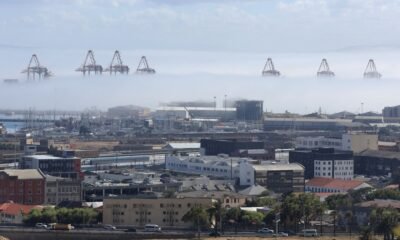
 Economy21 hours ago
Economy21 hours agoFacing US tariffs, South Africa steps toward trade deal with China
-
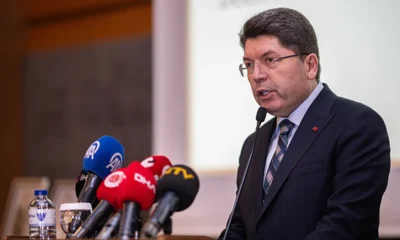
 Daily Agenda22 hours ago
Daily Agenda22 hours agoMinister of Justice Tunç: “The regulation regarding children involved in crime will come to the parliament after the commission works are completed.”
-

 Sports22 hours ago
Sports22 hours agoTurkish center Alperen Şengün named in 2026 NBA All-Star
-

 Sports8 hours ago
Sports8 hours agoAkar carries Türkiye’s hopes into Olympic short track spotlight
-
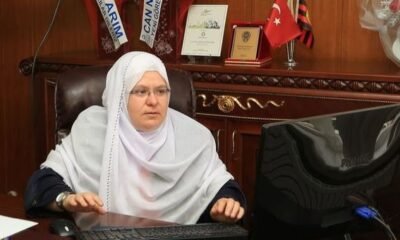
 Politics7 hours ago
Politics7 hours agoArrest, outrage after far-right man targets Turkish mayor’s dress
-

 Daily Agenda2 days ago
Daily Agenda2 days agoA Akıncı passed from this world
-

 Daily Agenda12 hours ago
Daily Agenda12 hours agoImmoral and excessive attack on women




